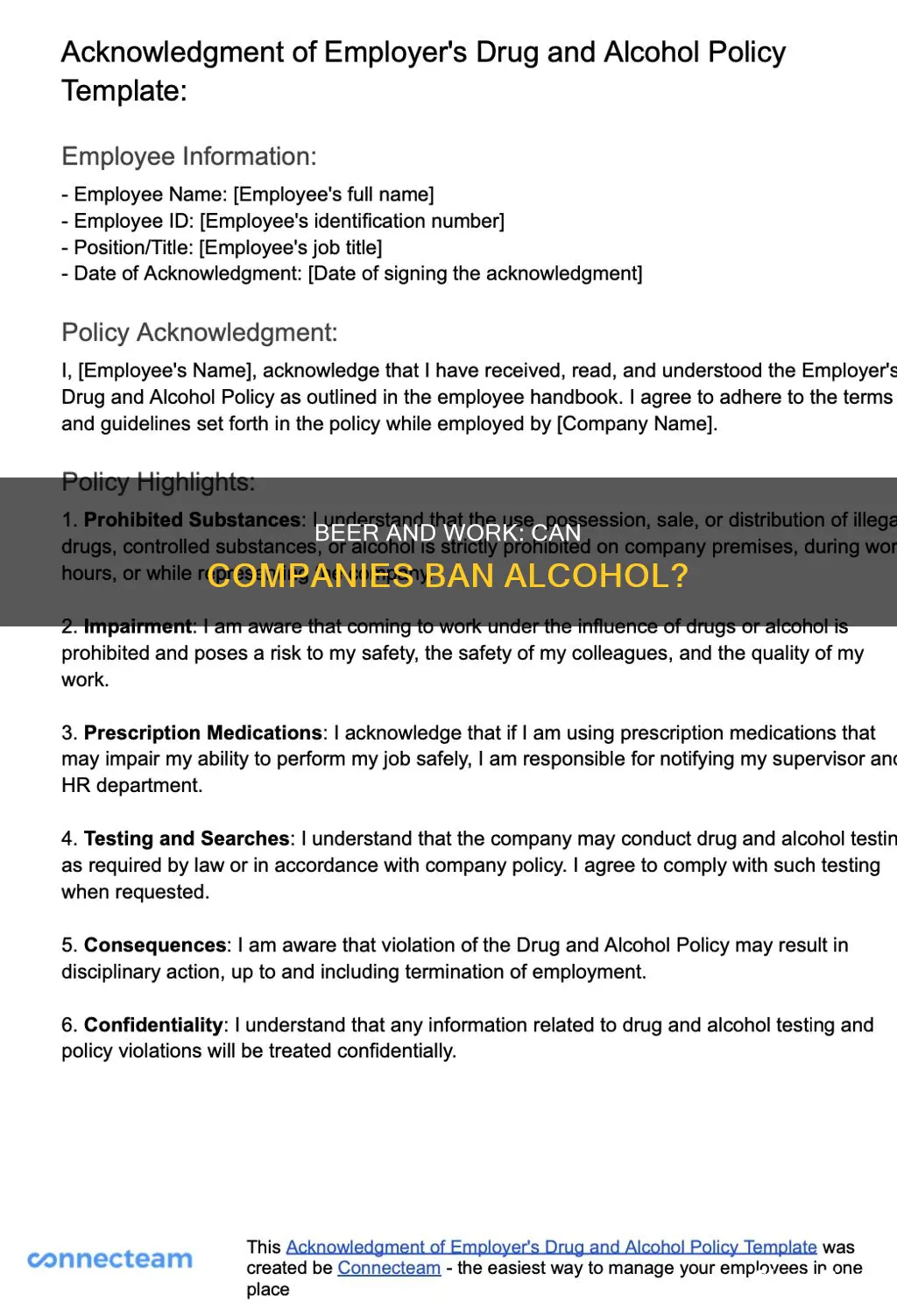
Alcohol consumption in the workplace is a highly debated topic. While there are no laws explicitly prohibiting alcohol consumption at work, certain industries, such as those involving driving or operating machinery, are subject to laws that prohibit drinking on the job. Many workplaces have a zero-tolerance policy towards drinking during working hours, prioritising employee safety and productivity. However, some companies have adopted more relaxed policies, allowing employees to consume alcohol during breaks or after work on the premises. Ultimately, each workplace will have its own policy regarding alcohol consumption, and it is essential for employees to understand and adhere to these guidelines to maintain a safe and productive work environment.
| Characteristics | Values |
|---|---|
| Can a company prevent employees from drinking alcohol outside of work? | In the US, there is no federal law that prevents companies from implementing a policy that forbids employees from drinking alcohol outside of work. However, state laws may offer protections. |
| Can a company prevent employees from drinking alcohol during work hours? | Yes, companies can implement policies that prohibit or limit alcohol consumption during work hours. This is especially important for safety reasons, such as when operating machinery or driving. |
| Can a company require employees to take an alcohol test? | It is not uncommon for companies to conduct alcohol testing, especially in industries where safety is a concern. However, this may vary depending on local laws and employee handbooks. |
| Can employees be disciplined or terminated for drinking alcohol? | Yes, employees can be disciplined or terminated for drinking alcohol, especially if it affects their work performance, violates company policies, or puts the company at risk. |
| Are there any exceptions to company alcohol policies? | There may be exceptions for certain industries, such as bartenders or brewers, where alcohol tasting is part of their job. However, companies should still promote responsible drinking and ensure employee safety. |
What You'll Learn

Company policies on drinking during work hours
Legal and Safety Considerations:
- Duty of Care: Employers have a legal duty of care towards their employees, which includes ensuring their safety, health, and wellbeing. This means that employers may prohibit alcohol consumption during work hours to comply with health and safety regulations.
- Industry-Specific Regulations: Certain industries, such as transportation, have specific laws and regulations that prohibit drinking during work hours. For example, the Transport and Works Act 1992 and the Road Traffic Act 1988 apply to jobs involving driving, operating machinery, or public transport, making it illegal to drink during work hours.
- Disciplinary Actions: While employment laws may not prohibit alcohol consumption during work hours, companies often have their own policies and disciplinary actions for employees who drink on the job. These policies usually define what constitutes misconduct or gross misconduct and outline the health and safety implications.
Company Culture and Employee Wellbeing:
- Zero-Tolerance Policy: Some companies have a zero-tolerance attitude towards drinking during work hours, even if the employee's job role does not involve activities like driving or operating machinery. This policy aims to ensure that alcohol does not negatively impact employee productivity, safety, and overall wellbeing.
- Moderate Consumption: Some workplaces may allow moderate alcohol consumption during lunch breaks, as long as it is not on the company premises. However, employees should still consume alcohol in moderation to avoid losing focus and putting themselves or others at risk.
- Support for Alcohol Problems: Companies should offer support and resources for employees struggling with alcohol abuse or dependence. This can include employee assistance programs (EAPs), counselling, and referral to treatment programs or support groups. It is important to treat employees with alcohol problems with compassion and provide them with the necessary help while also holding them accountable for their conduct and performance.
- Alcohol-Free Work Functions: Companies should also consider their policies regarding alcohol consumption during work functions or social events. Clear guidelines and responsible drinking practices should be encouraged to prevent excessive drinking and maintain a safe environment for all attendees.
Practical Implementation:
- Screening and Testing: In safety-critical roles, employers may implement alcohol screening and testing to ensure employees are not under the influence during work hours. However, this should be done with employee consent and as part of the company's health and safety policy.
- Disciplinary Procedures: When dealing with employees who are suspected of drinking during work hours, companies should follow proper procedures. This includes documenting performance and conduct issues, referring employees to the EAP or other support services, and taking appropriate disciplinary or corrective actions if necessary.
- Back-to-Work Conferences: After an employee has completed treatment for alcohol abuse, companies should consider holding a back-to-work conference involving the employee, supervisor, EAP counselor, and other relevant parties. This conference can help facilitate a smooth transition back to the workplace and ensure any necessary changes or accommodations are made.
- Relapse Prevention: Relapse is a common occurrence in the treatment of alcoholism. Companies should be aware of this possibility and coordinate with the EAP counselor and treatment providers to help prevent and manage relapses effectively.
In summary, company policies on drinking during work hours can vary, but the primary focus should be on employee safety, wellbeing, and compliance with legal and industry-specific regulations. Companies should offer support for employees struggling with alcohol abuse while also enforcing policies to maintain a safe and productive work environment for all.
Mormon and Beer: What's the Deal?
You may want to see also

Drinking alcohol during lunch breaks
In the United States, most states have "at-will" employment, which means employers can fire employees for any reason that is not illegal. However, federal and state laws prohibit discrimination based on certain characteristics, such as race, gender, and religion. Additionally, companies may have their own policies regarding alcohol consumption, and employees may be subject to disciplinary action or termination if they violate these policies.
It is essential to refer to the company's employee handbook or policies to understand their specific stance on alcohol consumption during lunch breaks. Some companies may allow a certain number of drinks, while others may prohibit it completely. It is also important to consider the potential risks associated with working while impaired, as it can lead to decreased productivity, increased sick days, and a higher likelihood of accidents or injuries.
When it comes to drinking alcohol during lunch breaks, it is crucial to act responsibly and ensure that it does not interfere with job performance or compromise safety. It is also worth noting that cultural differences exist regarding attitudes toward alcohol consumption, with some countries or regions having more relaxed norms than others.
Wisconson's Teen Beer Drinking Laws Explained
You may want to see also

Drinking alcohol while working with hazardous materials
Many companies have strict policies in place prohibiting the consumption of alcohol during work hours, and with good reason. Working with hazardous materials requires a clear head and a steady hand. Even a small mistake could have disastrous consequences. It is simply not worth the risk.
Furthermore, drinking on the job can create a culture of unhealthy alcohol consumption, leading to addiction and other serious problems. It is important to be able to enjoy a drink responsibly, but when it comes to working with hazardous materials, it is always better to err on the side of caution.
Some companies may even go so far as to implement random alcohol screenings to ensure their employees' sobriety. While this may seem extreme, it is done with the safety of the employees and the general public in mind.
In conclusion, when it comes to drinking alcohol while working with hazardous materials, the risks far outweigh any potential benefits. It is crucial to remain sober and alert while handling such materials to ensure the safety of everyone involved.
Beer and Cephalexin: Is It Safe to Drink?
You may want to see also

Drinking alcohol while operating heavy machinery
If you are caught drinking alcohol while operating heavy machinery, there can be serious consequences. In the United States, the Department of Labor reports that 65% of on-the-job accidents are the result of drug or alcohol use at work, and 38 to 50% of workers' compensation claims are related to working while impaired. If you are found to be operating heavy machinery while intoxicated, you can be fired and even face legal consequences.
It is important to note that the dangers of drinking alcohol while operating heavy machinery are not limited to the construction industry. Any industry that requires the use of hazardous machinery, such as wood processing machinery, ladders, electrical equipment, or machinery with exposed moving parts, can be made even more dangerous by the presence of alcohol.
It is the responsibility of both employees and employers to ensure that no one is operating heavy machinery while under the influence of alcohol. Employees should be aware of the risks and avoid drinking alcohol before operating any type of machinery. Employers should have clear policies in place that prohibit alcohol consumption while operating machinery and take steps to enforce these policies, such as regular drug and alcohol testing.
In conclusion, drinking alcohol while operating heavy machinery is a dangerous and irresponsible act that can have serious consequences. It is important for both employees and employers to take the necessary steps to ensure that no one is putting themselves or others at risk by operating machinery while under the influence of alcohol.
Beer and Football: Ohio State's Game-Day Drinking Policy
You may want to see also

Drinking alcohol-free beer at work
- Company Policies: The company's stance on alcohol consumption during work hours is crucial. Some companies may have strict policies prohibiting any alcohol consumption during work hours, regardless of the alcohol content. Others may allow moderate consumption, as long as it does not impair an employee's ability to work safely and effectively. It is essential to refer to the company's employee handbook or check with the HR department to understand the specific policies in place.
- Legal Considerations: The legality of drinking alcohol-free beer at work can vary depending on your location. In some jurisdictions, non-alcoholic beers may still fall under liquor laws and be subject to the same restrictions as regular alcoholic beverages. Additionally, certain industries, such as those involving hazardous materials or heavy machinery, may have specific regulations prohibiting alcohol consumption during work hours. It is important to be aware of the relevant laws and regulations in your area to ensure compliance.
- Employee Responsibilities: The nature of an employee's work responsibilities can also influence the decision to drink alcohol-free beer at work. If an employee operates heavy machinery, handles hazardous chemicals, or performs other safety-critical tasks, it is generally advisable to refrain from consuming any alcoholic beverages, including non-alcoholic beers, during work hours. Even a small amount of alcohol can impair judgment and increase the risk of accidents or injuries.
- Perception and Professionalism: Drinking alcohol-free beer at work may raise eyebrows and create a negative perception among colleagues and clients. Even if the beverage is truly non-alcoholic, the resemblance to regular beer may lead others to assume that you are consuming alcohol on the job. This could impact your professional image and potentially affect your career prospects.
- Health and Wellbeing: While non-alcoholic beers have a significantly lower alcohol content, excessive consumption can still have health implications. These beverages often contain high levels of calories and carbohydrates, which may contribute to weight gain and other health issues if consumed in large quantities. Additionally, for individuals in recovery from alcohol addiction, consuming non-alcoholic beers may trigger cravings and increase the risk of relapse. It is important to consider the potential impact on your health and wellbeing before incorporating alcohol-free beers into your work routine.
- Company Culture: The company's culture and management style can also play a role in determining the appropriateness of drinking alcohol-free beer at work. In some organizations, particularly those in the beverage or hospitality industry, moderate alcohol consumption during work hours may be accepted or even encouraged as part of the company culture. However, it is crucial to respect the boundaries set by your employer and avoid excessive consumption that could negatively impact your work performance or professional image.
In conclusion, while drinking alcohol-free beer at work may be permissible in some cases, it is essential to consider the company's policies, legal restrictions, employee responsibilities, and potential health implications. It is always advisable to prioritize safety, professionalism, and compliance with relevant laws and regulations when making decisions about alcohol consumption in the workplace.
Beer and Clonazepam: Safe Mix or Risky Business?
You may want to see also
Frequently asked questions
In general, there are no laws that specifically prohibit the consumption of alcohol outside of work. However, if your job requires you to operate vehicles, machinery, or public transport, you must comply with the Transport and Works Act 1992 and the Road Traffic Act 1988, which make it illegal to drive under the influence of alcohol.
While there are no laws specifically concerning drinking during work hours, it is generally not allowed. Many workplaces have a zero-tolerance policy and prohibit alcohol consumption during office hours to ensure safety and productivity.
In the United States, most states have "at-will" employment, which means that employees can be fired for any reason that is not illegal. However, federal law prohibits discrimination based on race, gender, religion, national origin, age, sexual identity, disability, genetic information, or military service. Therefore, it is essential to understand your company's policies and local laws regarding alcohol consumption.







